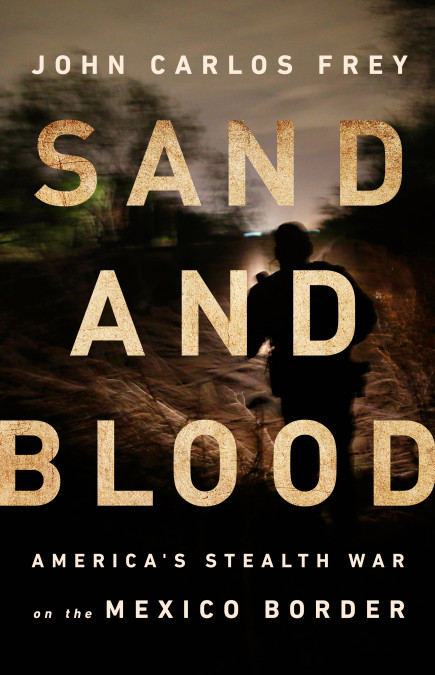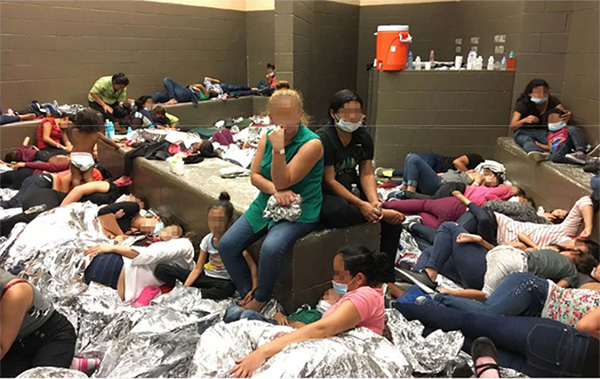Check It Out:
SAND AND BLOOD: America’s Stealth War on the Mexico Border
| revcom.us
The following is a letter from a reader on a recently published book. We felt the letter would be of interest to other readers. We appreciate hearing from our readers and encourage readers to send in correspondence. The views expressed by the writers of this and other reader letters are, of course, their own; and they are not responsible for the views published elsewhere on our website.
You know the Revolution Club is not playing around when it went to the border between Mexico and the U.S. and burned six American flags on July 4. They literally entered a war zone with an internationalist message to people across the border and around the world. Internationalism, the whole world comes first. It’s with that spirit that I want to inform readers about a new and important book I just read.
After reading SAND AND BLOOD: America’s Stealth War on the Mexico Border I have a greater appreciation for the people of Central America and Mexico who journey to the border to come to the U.S. Some know it, some have weighed the stakes, and many don’t know but when they come to the border they are entering a war zone.
This book SAND AND BLOOD, written by John Carlos Frey, is a great contribution to the fight against the war on the masses of people being waged by the U.S. at the southern border. Yes, it is Capitalism/Imperialism bringing hell to the people trying to cross the border and hell to those in the States who would help them. But Frey chooses one word that gets at the heart of horror and murder taking place. He calls it “a culture of cruelty. If they come, let them suffer. Make them suffer so they won’t come. But still people will. It is the most rational thing for millions to do.”
The author writes: “Migrants have described agents hurling verbal abuse. Racial slurs, and curses and inflicting sexual assault and physical violence—even causing death. Eighty-four migrants have died at the hands of Border Patrol agents since 2010. These practices appear to be systematic, amounting to what insiders refer to as a culture of cruelty.” He goes on to say that according to his sources, "cruelty is part of the training.” (p. 134)
Let me quote from the inside of the book jacket to give readers a better sense of this book, which says that SAND AND BLOOD takes “readers to the Border Patrol outposts, unmarked graves, detention centers, and halls of power, SAND AND BLOOD is a frightening, essential story we must not ignore.”
With Noam Chomsky precision he documents step by step: presidential administrations, laws, and various campaigns aimed at deterring people from coming to cross the border. He documents his assertions. From President Nixon, through H.W. Bush, and Bill Clinton, whom he asserts played a major if not decisive role, in escalating the border from an area of conflict to one of open warfare. Nearly 700 miles of wall in California, Arizona, and Texas were erected at his hands. G.W. Bush, Barack Obama (deporter-in-chief), and Trump are reviewed for their crimes. While he particularly slams Trump’s moves, he points out that the law used by Sessions and Trump to separate families, ripping children out of the arms of their parents, was created during G.W. Bush’s rule. And yes, “crooked mouth” Dick Cheney makes his entrance too. There exists a symbiotic relationship between the War on Terror and the War on Drugs and the War on the Border. In the name of these wars, many innocent migrants are being killed.
Frey really does penetrate the halls of power, documenting and footnoting how and why there is a “stealth war on the Mexico border.” This is the part of the book which is frightening, as he describes in detail the horrible assault on a population of people who have done no wrong other than to seek a better life in the country that is responsible for the misery and squalor at home that they are trying to escape.
While this section of the book is interesting and full of who is who, of defense contractors making billions of dollars off this war and designing military technologies with which better to slam the migrants—it is the “war correspondent” part of the book that really stood out to me. Frey gets right down on the ground and goes to cemeteries; goes to the detention centers; goes to the border towns; and even pays a cartel to take him on a journey from Guatemala to the border, and yes, he goes into the death-enticing deserts and mountains where thousands have died. He talks with people who have placed water strategically, finding how angry they are that Border Patrol takes the paths of immigrants, with one thought in mind: Destroy the water that sanctuary advocates have left to assist desperate migrants who may have run out of water saving their lives. It truly is a culture of cruelty to go out to the desert and mountains and deprive people of water meant to save their lives.
Look, this is an important book. I am a Vietnam veteran and I know what it is like when America wages a genocidal war against people. Particularly people of color. At age seventeen, 3 days out of high school, I was in a U.S. Navy boot camp being taught that the correct nomenclature to identify the Vietnamese people is “GOOK.” I’ll never forget it. I’ll never stop hating it. And I’ll never give aid and comfort to the enemy, USA. So Frey calls the border a war zone. Is it? Well here is an example of the language that Border Patrol agents use. To set the stage Frey tells a story from a video he has that one of those who leave water in the desert took of the Border Patrol not knowing they were being filmed by a hidden camera.
The bottles [of water] crash against rocks bursting open. She [the agent who threw it] smiles. Another agent also smiles, seeming to take real pleasure in the spectacle. He says something under his breath, and the word “tonk” is clearly audible. “Tonk” (it turns out) is a bit of derogatory slang that some Border Agents use to refer to undocumented immigrants. One agent told me that it derives from the sound a flashlight makes when you hit someone over the head—“tonk.”(p. 132)
I’m sorry to indulge you but there is one more short story I must relay. It is a snapshot of what goes on at the border.
Frey writes:
This rookie force was armed with batons, pepper spray, Tasers, rifles, and handguns. It has an array of military technology at its disposal from ground and night sensors to unmanned drones and Black Hawk helicopters. Along with its military weapons, Border Patrol received military training.(p. 134)
The part of the book that is really inspiring, while often bitter sweet, is when Frey puts the stories and the words of migrants front and center for everyone to engage. He does this with great humility. He gives a platform for the migrants to speak truth. A platform to tell their stories of horror and abuse. He gives them a platform to show their humanity.
The author recounts a lesson learnt by him. He talks of when he met three women from Guatemala who were traveling without a guide. They were a grandmother, mother, and daughter. They had gone all the way from Guatemala up to about 20 miles from the Mexico-U.S. border. He spent some time with them getting background and it came to light that the men in their lives had caused them great harm. This is why the three of them struck out alone. He stressed to them to reconsider and get a guide. He told them it was too dangerous to cross without one. Frey reports the words of the mother:
Kindly but powerfully the mother said, “we already made all the decisions a long time ago. There is nothing left to decide.” She explained that she didn’t want to be in the company of men or a guide. She was fleeing an abusive husband. She mentioned the lack of opportunity in Guatemala for her and her daughter. She told me how women are treated in that country: like the possessions of men. She told me about the health care system there and that if she stayed, there would be no hope for her mother....She wrestled with the thought of leaving her home town, her relatives, her friends, her job, and everything she had ever known....She had only one option: to migrate north. She had already made the decision to mobilize—uproot her family and enter a country illegally through a process in which people die and women get raped.”(pp. 95-96)
And finally let me close with a story that is so similar to Rodney King’s beating in Los Angeles by the Los Angeles police. In a similar setting, Border Patrol agents killed Anastasio Hernández Rojas in 2010. Frey reports on a video clip he has retrieved:
He was in the process of being deported for being undocumented. Hernandez was severely beaten, shocked with a Taser, and killed. The video reveals that at the time he was surrounded by about twelve border officials.
One witness on the Mexico side of the border said that the agents hit Hernandez with their batons over and over while others punched and kicked him. A Border Patrol supervisor arrived on the scene, but instead of intervening, he permitted the agents to continue. (p. 145)
Please go to your libraries and ask them to order this book .Go on-line and purchase it. Because Trump and Pence are at the helm now, we must do everything to drive them out of power and as we do that we must give political support to our sisters and brothers in Central America and Mexico and around the world. We need to build lots of Revolution Clubs everywhere we can. As Bob Avakian has said, “A Better World IS Possible.”

Q&A: Bob Avakian's Answer to People Who Complain about Immigrants Crossing Borders
Share widely on social media
 Detention Center, Weslaco, Texas, June 11, 2019. Photo: Office of Inspector General, Dept of Homeland Security
Detention Center, Weslaco, Texas, June 11, 2019. Photo: Office of Inspector General, Dept of Homeland Security
Get a free email subscription to revcom.us:

